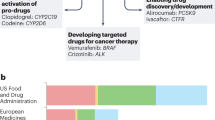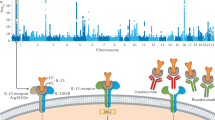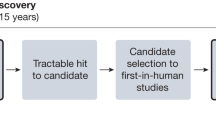Abstract
The success of the Human Genome Project raised expectations that the knowledge gained would lead to improved insight into human health and disease, identification of new drug targets and, eventually, a breakthrough in healthcare management. However, the realization of these expectations has been hampered by the lack of essential data on genotype–drug-response phenotype associations. We therefore propose a follow-up to the Human Genome Project: forming global consortia devoted to archiving and analysing group and individual patient data on associations between genotypes and drug-response phenotypes. Here, we discuss the rationale for such personalized medicine databases, and the key practical and ethical issues that need to be addressed in their establishment.
This is a preview of subscription content, access via your institution
Access options
Subscribe to this journal
Receive 12 print issues and online access
$209.00 per year
only $17.42 per issue
Buy this article
- Purchase on Springer Link
- Instant access to full article PDF
Prices may be subject to local taxes which are calculated during checkout
Similar content being viewed by others
References
Collins, F. S. et al. A vision for the future of genomics research. Nature 422, 835–847 (2003).
Flordellis, C. S. The emergence of a new paradigm of pharmacogenomics. Pharmacogenomics 6, 515–526 (2005).
Aharon-Peretz, J., Rosenbaum, H., Gershoni-Baruch, R. Mutations in the glucocerebrosidase gene and Parkinson's disease in Ashkenazi Jews. N. Engl. J. Med. 351, 1972–1977 (2004).
Altman, R. B, Rubin, D. L. & Klein, T. E. An 'Omics' view of drug development. Drug Dev. Res. 62, 8185 (2004).
Nebert, D. W. & Vesell, E. S. Advances in pharmacogenomics and individualized drug therapy: exciting challenges that lie ahead. Eur. J. Pharmacol. 500, 267–280 (2004).
Frueh, F. W. & Gurwitz, D. From pharmacogenetics to personalized medicine: a vital need for educating health professionals and the community. Pharmacogenomics 5, 571–579 (2004).
Gurwitz, D. & Weizman, A. Personalized psychiatry: a realistic goal. Pharmacogenomics 5, 213–217 (2004).
Hewett, M. et al. PharmGKB: the Pharmacogenetics Knowledge Base. Nucleic Acids Res. 30, 163–165 (2002).
Klein, T. E. & Altman, R. B. PharmGKB: the pharmacogenetics and pharmacogenomics knowledge base. Pharmacogenomics J. 4, 1 (2004).
Ferrin et al. Enhancing data sharing in collaborative research projects with DASH. Pac. Symp. Biocomput. 260–271 (2005).
Gibson, L. GlaxoSmithKline to publish clinical trials after US lawsuit. BMJ 328, 1513 (2004).
Knoppers, B. M. & Chadwick, R. Human genetic research: emerging trends in ethics. Nature Rev. Genet. 6, 75–79 (2005).
Couzin, J. Drug safety. Withdrawal of Vioxx casts a shadow over COX-2 inhibitors. Science 306, 384–385 (2004).
International Committee of Medical Journal Editors. Clinical trial registration: a statement from the International Committee of Medical Journal Editors. N. Engl. J. Med. 351, 1250–1251 (2004).
Cambon-Thomsen, A., Sallee, C., Rial-Sebbag, E. & Knoppers, B. M. Population genetic databases: is a specific ethical and legal framework necessary? GenEdit 3 [on-line], <http://www.humgen.umontreal.ca/int/GE/en/2005-1.pdf> (2005).
Breckenridge, A. et al. Pharmacogenetics: ethical problems and solutions. Nature Rev. Genet. 5, 676–680 (2004).
Lunshof, J. E. Personalized medicine: how much can we afford? A bioethics perspective. Personalized Medicine 2, 43–47 (2005).
Harris, J. & Sulston, J. Genetic equity. Nature Rev. Genet. 5, 796–800 (2004).
Lesko, L. J. & Woodcock, J. Translation of pharmacogenomics and pharmacogenetics: a regulatory perspective. Nature Rev. Drug Discov. 3, 763–769 (2004).
Falit, B. The path to cheaper and safer drugs: revamping the pharmaceutical industry in light of GlaxosmithKline's settlement. J. Law Med. Ethics. 33, 174–179 (2005).
Waller, P. C., Evans, S. J. & Beard, K. Drug safety and regulation. BMJ 331, 4–5 (2005).
Gurwitz, D. Should Third-World countries pay the tab for new drug development? Acad Med. 74, 203 (1999).
Resnik, D. B. Developing drugs for the developing world: an economic, legal, moral, and political dilemma. Developing World Bioeth. 1, 11–32 (2001).
Institute of Medicine Report. To Err Is Human. Building a Safer Health System. (Committee on Quality of Health Care in America, Institute of Medicine) (eds Kohn, L., Corrigan, J. & Donaldson, M.) (National Academy, Washington DC, 1999).
Ernst, F. R. & Grizzle, A. J. Drug-related morbidity and mortality: updating the cost-of-illness model. J. Am. Pharm. Assoc. (Wash). 41, 192–199 (2001).
Dormann, H. et al. Readmissions and adverse drug reactions in internal medicine: the economic impact. J. Intern. Med. 255, 653–663 (2004).
Pirmohamed, M. et al. Adverse drug reactions as cause of admission to hospital: prospective analysis of 18,820 patients. BMJ 329, 15–19 (2004).
Humphreys, B. L., Lindberg, D. A., Schoolman, H. M. & Barnett, G. O. The Unified Medical Language System: an informatics research collaboration. J. Am. Med. Inform. Assoc. 5, 1–11 (1998).
Dolin, R. H. et al. HL7 Clinical Document Architecture, Release 2. J. Am. Med. Inform. Assoc. 2005 Oct 12 [epub ahead of print].
Lussier, Y. A., Rothwell, D. J. & Cote, R. A. The SNOMED model: a knowledge source for the controlled terminology of the computerized patient record. Methods Inf. Med. 37, 161–164 (1998).
McDonald, C. J. et al. LOINC, a universal standard for identifying laboratory observations: a 5-year update. Clin. Chem. 49, 624–633 (2003).
Smith, C. L., Goldsmith, C. A. & Eppig, J. T. The Mammalian Phenotype Ontology as a tool for annotating, analyzing and comparing phenotypic information. Genome Biol. 6, R7 (2005).
Altman, R. B. Building successful biological databases . Brief Bioinform. 5, 4–5 (2004).
van Ommen, G. J. Genomics: the human genome, revisited. Eur. J. Hum. Genet. 13, 265–267 (2005).
Acknowledgements
The authors wish to thank anonymous referees for their insightful comments.
Author information
Authors and Affiliations
Corresponding author
Ethics declarations
Competing interests
The authors declare no competing financial interests.
Related links
Rights and permissions
About this article
Cite this article
Gurwitz, D., Lunshof, J. & Altman, R. A call for the creation of personalized medicine databases. Nat Rev Drug Discov 5, 23–26 (2006). https://doi.org/10.1038/nrd1931
Published:
Issue Date:
DOI: https://doi.org/10.1038/nrd1931
This article is cited by
-
Open biomedical pluralism: formalising knowledge about breast cancer phenotypes
Journal of Biomedical Semantics (2012)
-
Unique Risks, Benefits, and Challenges of Developing Drug-Drug Combination Products in a Pharmaceutical Industrial Setting
Combination Products in Therapy (2012)
-
Genomics and policymaking: from static models to complex systems?
Human Genetics (2009)
-
PharmGED: Pharmacogenetic Effect Database
Clinical Pharmacology & Therapeutics (2007)
-
Pharmacogenetics/genomics of membrane transporters in cancer chemotherapy
Cancer and Metastasis Reviews (2007)



